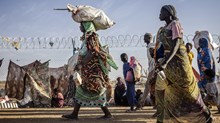A few days before the summer solstice—Stephen Hawthorne's first Christmas in Bolivia—he saw women selling moss in the street, and he bought some for a manger scene. He and his wife arranged their Nativity figures on the moss, put some lights around it, and thought it looked lovely. Soon, members of the evangelical church they attended dropped by. "They were absolutely horrified when they saw what we'd done," says Hawthorne. "We said, 'What's the matter?' They said, 'This is idolatry.'"
Oddly enough, Hawthorne says, when he and his family visited one of the churches that condemned manger scenes, "We in our turn were horrified to see this huge blow-up figure of Santa Claus on top of the church. It was a lesson to us about how people give meaning to symbols."
Hawthorne, who has lived in the country 19 years as a medical missionary with Serving in Mission (SIM), says it's not difficult to understand why Bolivian evangelicals tend toward iconoclasm: "Everybody who's not a Christian would have a little box somewhere in their house, and there will be a little figure of a saint that they'll pray to. They'll look to a figure—and it's not just a nice reminder."
In fact Dave Hoffman, a vice president at John Stott Ministries, says Bolivian pastors told him they had to quit putting Nativity scenes outside their churches because "people that were just walking by the church would actually stop and worship the figure of the baby Jesus in the manger."
But evangelicals in Latin America aren't just fighting for obedience to the second commandment. Increasingly, Hoffman says, they are declining to celebrate Christmas at all, let alone decorate. Their reasons have to do with distancing themselves from what they see as pagan worship and forming an evangelical identity.
Hoffman says evangelicals in Latin America—especially Pentecostals and neo-Pentecostals—raise two main objections to the celebration of Christmas: The Bible is not specific about the date of Christ's birth, and the date most Christians celebrate the holiday was chosen to correspond to a pagan holiday.
These objections aren't new. Christian leaders as far back as Gregory Nazianzus in the fourth century have cautioned against the paganism that Christmas competes with. "Therefore let us keep the Feast, not after the manner of a heathen festival, but after a godly sort; not after the way of the world, but in a fashion above the world."
Charles Spurgeon also taught against celebrating Christmas. "We have no superstitious regard for times and seasons," he said. "Certainly we do not believe in the present ecclesiastical arrangement called Christmas … we find no scriptural word whatever for observing any day as the birthday of the Savior; and consequently, its observance is a superstition, because [it's] not of divine authority … Probably the fact is that the 'holy days' [were] arranged to fit in with the heathen festivals."
Spurgeon was reiterating the teaching of Puritans, who observed no religious holidays but Sabbaths. Theologian J. I. Packer says they were "unwarrantably insistent in understanding the Scripture to mean you don't do anything that isn't exemplified or commanded in Scripture." In fact, from 1659 until 1681, citizens of the colony of Massachusetts were likely to be fined 5 shillings for observing "any such day as Christmas."
Anglican Bishop of Bolivia Frank Lyons says the thinking behind not celebrating Christmas traditionally is, "Because [Catholics] do it, we don't do it."
Gayna Dunham Salinas, who also accidentally scandalized a group of Bolivian Christians by having a Nativity scene in her house, lived in Bolivia for more than a decade and is now in Paraguay working for Latin America Mission. She says the trend toward rejecting Christmas "comes back to a really weak definition of what evangelical is. The definition that everyone else has given them is that it's non-Catholic."
But, she says, Bolivians would probably express their disapproval by labeling the practices mundano—worldly. Many of the students she encounters, especially those from the megachurch Eklesia, submit to bans on celebrating Christmas or Easter, wearing makeup or jewelry, or dating someone without their pastor's approval.
Hawthorne says another reason new groups of Christians don't observe traditional holidays is that they haven't been incorporated into the broader church. "To be honest, the Quechua Christians that I've been working with the most haven't been well taught about Christmas." He partially blames himself—the Hawthornes hole up on Christmas and spend it as a private family day, as do many North Americans.
Regarding the objection about the timing of the holiday, Lyons says that if Christmas was "just plopped down on top of" Saturnalia, it was an honorable attempt to provide an antidote to the pagan new year. "It's interesting that churches that believe in spiritual warfare don't see Christmas as a way to do that."
"The historic churches use the Christian year to rehearse or represent the events of the life of Christ. We dedicate the whole year to the life of Christ. That's not a salvation issue, but it helps us remember how we can understand [Jesus Christ] better," Lyons said.
When Christians don't set aside a holy day for Christ's birth, Lyons says, "I think the whole doctrine of the Incarnation is lost. We may refer to it every now and then, but the whole historical aspect of the faith that brings it into the present falls by the wayside."
Copyright © 2008 Christianity Today. Click for reprint information.
Related Elsewhere:
For more articles about the Incarnation, Christmas worship, and more see our Christmas special section.
Previous articles on idolatry include, "Reformed Protestants No Longer See Images as Idolatrous," and "'You Shall Not Worship Me This Way.'"

Support Our Work
Subscribe to CT for less than $4.25/month


















